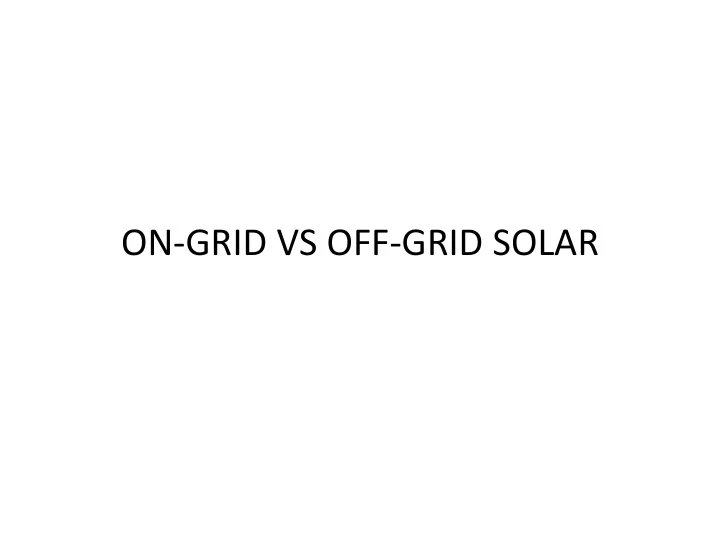

ON-GRID VS OFF-GRID SOLAR
On-Grid Solar is solar generation that is connected to the utility grid All solar generation enters the grid “co - generation” with solar The grid provides backup power for a normally stand-alone solar installation
All generation enters the grid S olar ‘farm’ owned by the utility to supplement diesel Utility has full control of solar input to the grid Solar ‘farm’ owned by an IPP Utility has specific limited control of solar input to the grid
Advantages: Maximum reduction of utility diesel use Lower cost of generation than diesel Utility has real-time control of access to solar generation Control over quality and system compatibility of the solar installation
Disadvantages Installations tend to be concentrated geographically and therefore have maximum impact on stability Tends to increase the complexity of operational processes The installation of a variety of different inverter types by donors greatly increases the problems of control of the solar
Possible actions to reduce the effects of the disadvantages Set standards for equipment and type of installations and require donors and IPPs to meet those standards Require the inclusion of batteries or fast response diesel units to offset large variations in output Avoid geographical concentration of installations
“co - generation” with solar solar generation is first delivered to a load with any surplus solar generation entering the grid for utility use
Advantages Utility investment not required Maintenance by utility not required Typically a reduction of daytime peak demand results
Disadvantages Loss of revenue from customer Limited ability of the utility to control solar inputs Less control over technical quality and compatibility of the installation
Possible actions to reduce the effects of the disadvantages Utility ownership of installations Require installation of battery storage to offset fluctuations Establish and enforce standards for equipment that is connected to the grid
Off-Grid Solar Solar generation that is totally independent of the utility grid. Except for water pumping with tank storage, includes batteries for electricity storage
Solar home systems (SHS) Usually delivers DC power Capacity typically no greater than 200 Wp Focused on lighting and entertainment for residences
Advantages Greatly improves lighting quality Allows the use of small appliances that require electricity to operate Lower cost than alternatives for similar services Easy to install Maintenance is not complicated Cheaper than the alternatives for providing comparable services
Disadvantages Lack of funds when battery replacements are needed Access for maintenance is usually costly Often abused by end users leading to low reliability Requires specialised DC lights and appliances Usually systems are donor supplied and component quality or specifications often inappropriate
Possible actions to reduce the effects of the disadvantages Rent the SHS with rental payments covering battery replacement and general maintenance Do not allow customer access to batteries or controllers Make DC lights and appliances available through local shops Establish standards for the supply of SHS and enforce them
Off-grid AC supply Full grid services made available for facilities that are not connected to the grid Health centres, schools, island government facilities, visitor facilities, small rural industries Small scale electrification not operated and maintained by a public utility.
Advantages Can operate devices that require grid AC type electricity to function Much lower in cost per kWh relative to small diesel or petrol generators Easy to provide 24H power Higher reliability of power than small generators Low maintenance relative to small generators
Disadvantages High front-end cost May have substantial land requirements Poor control over equipment that is to be installed
Possible actions to reduce the effects of the disadvantages Use donor funding where practical Establish financing programmes to make systems financially acceptable Establish standards for equipment and system designs and enforce them
DISCUSSION
Recommend
More recommend